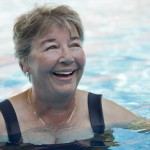
Due to increased life expectancy, populations around the world are ageing. Already, over one sixth of the UK population is aged over 65 years old, with pensions for this age group alone counting for one seventh of all public expenditure and higher NHS spending. As life expectancy increases, similar gains need to also be made in healthy life span to prevent rapid increases in spending on health care and social support.
Tackling depression in this age group may be important as depression in older age is associated with disability, poorer health outcomes, increased mortality and prolonged hospital stays along with reductions in quality of life (Rodda et al, 2011). It has been suggested that a simple exercise program for older adults could be effective in reducing depressive symptoms, but contradictory results have been published.
A new review aimed to investigate whether regular exercise was beneficial in reducing depression and improving quality of life and self-esteem in older people (Park, 2014).
Methods
To find studies, the authors searched several databases using relevant keywords. As the paper’s authors were based in Korea, they additionally searched 2 Korean nursing websites to ensure no Korean articles had been missed from the main database search. Articles returned by these searches were then checked to remove duplicates and irrelevant studies. From there, studies were then included in the review if they:
- Were published after 2000
- Only included participants aged 65 or older with no problems with orientation and who were capable of independent living
- Only used exercise programs designed for the elderly
- Used a no-treatment control or a non-exercise based intervention as a control (such as health education)
- Measured depression as a main outcome
Using these criteria, 18 studies were identified for review:
- Over half of these studies used participants aged 80 or over
- A variety of exercises were used, from walking to Tai Chi
- Exercise interventions varied from lasting for 6 weeks to 2 years. The frequency of exercise within these time periods is generally not given by the reviewers
- 8 of the 18 studies also measured quality of life, whilst only 3 measured self-esteem alongside depression scores

The review included many forms of exercise, from walking to Tai Chi, hence the obligatory senior couple frolicking on the beach picture
Results
Using a regression model, standard mean differences (SMD) for exercise vs. control were calculated across 16 studies (2 studies did not list standard deviation and means and so were excluded).
- Depression scores were found to be lower in the exercise groups compared to controls at follow-ups at 3, 6 and 12 months
- Overall, the exercise group had a lower mean depression score: SMD -0.36 (95% CI: -0.64 to -0.08)
- Exercise also improved quality of life scores: SMD 0.86 (95% CI: 0.11 to 1.62) compared to controls. This increased quality of life was found at 3, 6 and 12 months follow-up
- Of the 2 studies included that assessed self-esteem, both found increased self-esteem in the exercise group: SMD 0.49 (95% CI: 0.09 to 0.88)

Few people question the value of walking through the woods. The question is, can we quantify the impact this has on clinical depression?
Conclusion
The authors conclude that:
Exercise programs in older people are effective in improving depressive symptoms, quality of life and self-esteem.
Although this conclusion may be useful (exercise is a simple tool that could be readily applied as a treatment for depressive symptoms) there are limitations in the study that should also be considered.
The main problem with the paper’s conclusion arises from the large heterogeneity between the included studies’ measures of depression and quality of life, both having an I2 statistic approaching 100%. This variance between the included studies suggests that the results from the meta-analysis may be largely meaningless, as the studies are too different to be compared sensibly. However, the included studies are largely positive, so further research is just needed to clarify the relationship between exercise and depression.

Was it sensible to combine the various trials included in this review? We think not.
Link
Park S-H et al. Effects of exercise programs on depressive symptoms, quality of life and self-esteem in older people: A systematic review of RCTs. Applied Nursing Research, 2014 in press. [Abstract]
Rodda, J., Walker, Z., & Carter, J. (2011). Depression in older adults. BMJ, 343
Read all of the Mental Elf blogs on Depression and Exercise.


RT @Mental_Elf: Program of regular exercise may be beneficial in reducing depression in older adults http://t.co/H01ZModuUa
@Mental_Elf Trouble is, it get’s harder, as you get older. what we need is a system that eradicates depression, one with empathy, humanity!
RT @Mental_Elf: Effects of exercise programs on depressive symptoms, quality of life and self-esteem in older people http://t.co/bMCdyOJDQ5
#GoodMorning! “@Mental_Elf: Program of regular exercise may be beneficial in reducing depression in older adults http://t.co/PCQL9zLft2”
Mental Elf: Program of regular exercise may be beneficial in reducing depression in older adults http://t.co/1D10mxye1z
Nicola Davies liked this on Facebook.
Caroline Tomes liked this on Facebook.
Gill King liked this on Facebook.
Helen Corrigan liked this on Facebook.
The Mental Elf liked this on Facebook.
RT @Mental_Elf: Can regular exercise help reduce depression and improve quality of life and self-esteem in older people? http://t.co/bMCdyO…
RT @Mental_Elf: Can regular exercise help reduce depression & improve quality of life & self-esteem in older people? http://t.co/yGzd3qsigo
@ezconno621 Can regular exercise help reduce depression and improve quality of life and self-esteem in older people? http://t.co/ScO1Eyfik8
“@Mental_Elf: Can regular exercise help reduce depression and improve quality of life in older people? http://t.co/UuYEyMmcvT”
“: Can regular exercise help reduce depression and improve quality of life and self-esteem in older people? http://t.co/TJAhLVNtjK”
Best kept secret in psychiatry-Exercise is a very effective, safe, cheap treatment for depression http://t.co/XycdVdXec5
Program of regular exercise may be beneficial in reducing depression in older adults http://t.co/JmfRbmPBcR via @sharethis
Lynnelle Renee’ liked this on Facebook.
Don’t miss: Program of regular exercise may be beneficial in reducing depression in older adults http://t.co/H01ZModuUa
Program of regular exercise may be beneficial in reducing depression in older adults. http://t.co/XK9uY3b4Q2
@Mental_Elf says: effects of exercise programs on depressive symptoms, quality of life and self-esteem in older ppl http://t.co/76lk2EBtR9
Lynnelle Renee’ liked this on Facebook.
Nicola Davies liked this on Facebook.
Caroline Tomes liked this on Facebook.
Gill King liked this on Facebook.
The Mental Elf liked this on Facebook.